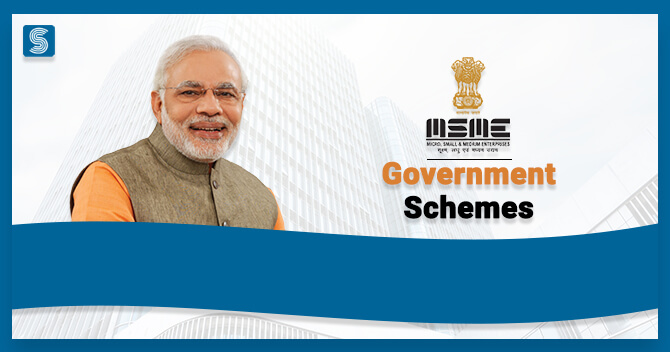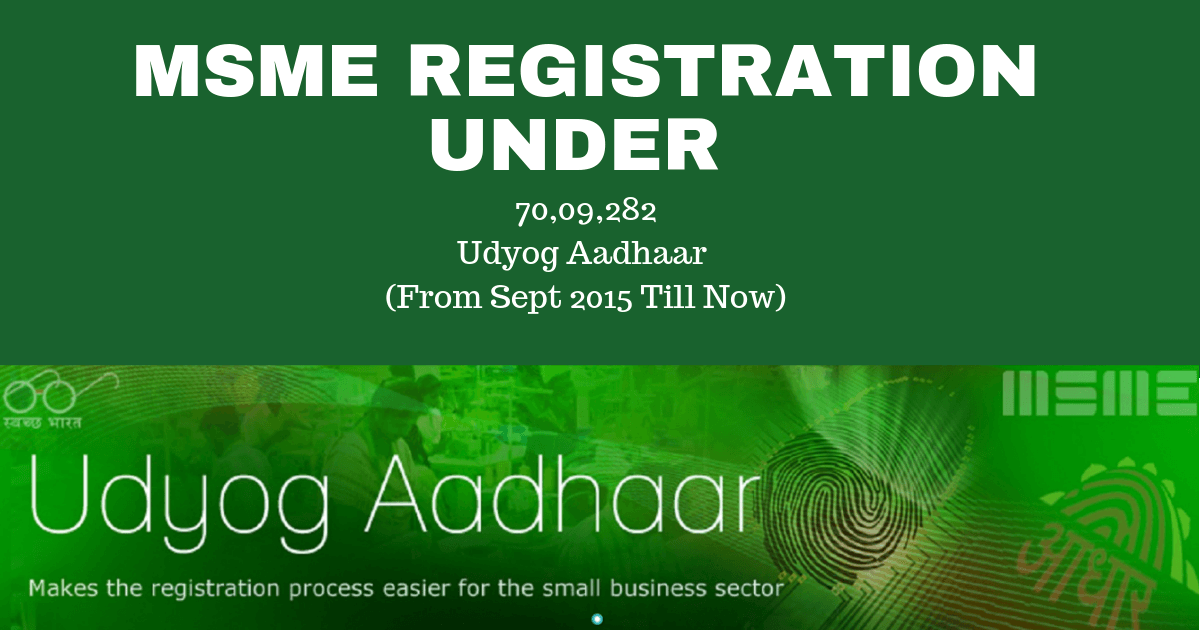Government Schemes that will Shape the Future of Indian MSME Sector

Savvy Midha | Updated: Feb 05, 2020 | Category: Government, MSME
The Micro, Small and Medium Enterprises (MSMEs) form a significant component of the Indian economy. The MSME sector in India is the second-largest in the world, after China. As per the statistics of 2017, there were 36 million MSMEs in India. Hence, it is evident that MSMEs play a significant role in the Indian economy, and the growth of the country is dependent on the growth of MSMEs. This is the reason why the Indian government keeps coming up with different MSME schemes and policies to uplift the growth and ease the business for MSME owners.
Table of Contents
What are MSMEs?
The MSMEs have been defined in Micro, Small and Medium Enterprises Development Act, 2006, based on Plant & Machinery and Equipment for Manufacturing Sector and Service Sector, respectively. The exact definition is explained henceforth.
The following shall be considered as MSMEs:
Manufacturing Sector
| Enterprises | Investment in Plant & Machinery |
| Micro Enterprises | Does not exceed INR 25 Lakhs |
| Small Enterprises | INR 25 Lakhs- INR 5 Crore |
| Medium Enterprises | More than five Crore rupees but does not exceed ten crore rupees |
Service Sector
| Enterprises | Investment in Equipment |
| Micro enterprises | Does not exceed ten lakh rupees |
| Small Enterprises | More than ten lakh rupees but does not exceed two crore rupees |
| Medium Enterprises | More than two crore rupees but does not exceed five crore rupees |
Schemes for MSMEs
From time to time, the government has launched MSME schemes to ensure the smooth working and growth of MSMEs. Many subsidies are provided to MSMEs from time to time. Following are some of the schemes that will shape the future of MSMEs in India:
Udyog Aadhar Memorandum Scheme
Via this scheme, the old registration procedure for MSMEs – SSI registration was replaced with a new registration process. The main aim of this MSME scheme was to do away with the hassle of some methods of MSME registration. The old procedure of registration required a lot of paperwork, and many documents were required to be attached at the time of submission. There were a total of 11 forms that had to be submitted in the previous registration process.
The new registration procedure of MSMEs in India is entirely online and free. It has only two forms – Entrepreneur Memorandum-I and Entrepreneur Memorandum- II. Since the implementation of the new system, around two-and-a-half Lakh MSMEs have been registered.
Under the new registration, when an MSME is registered using Aadhar card, it gets entitled to various subsidies, loans, hassle-free bank accounts, and many more related benefits. The system of the new registration process also recognized the MSME scheme separately, and the benefits are provided to them accordingly.
Women Entrepreneurship
As the name suggests, this MSME scheme encourages women to come ahead and hold a major sector of the entrepreneurial industry. Through this initiative of the government, women entrepreneurs are provided necessary benefits and skill training that are desirous to start entrepreneurship and considered MSMEs as an option. This scheme ensures economic well-found and independence to women by providing financial aid to their ideas for a start-up.
There exist similar schemes to serve the same purpose known as Income Generating Scheme. Such a scheme provides training relating to income generation through entrepreneurial activities. The government also provides MSME Loan to assist bright women with entrepreneur capabilities hence promoting women entrepreneurship
Grievances Monitoring Scheme
Since every scheme has its complaints and suggestions, the government has initiated grievances cell under MSME to monitor and cater to all sorts of claims and suggestions by business and MSME owners. Through this portal, grievances and complaints are lodged with ease, and all kinds of complaints are handled through this grievance system, ensuring transparent and quick disposal of complaints and grievances.
One can also keep track of the status of their complaints online; the system keeps them updated through regular updates. From lodging of a complaint to its disposal, grievances monitoring scheme is an entirely online process. Unique Registration Number is generated online once the complaint is registered.
Zero Defect Zero Effect Scheme
It is one of the potent MSME schemes of government [1] that ensures the quality of products manufactured and exported meets the ecological needs of countries around the world. This scheme also is known as the ZED scheme that ensures goods manufactured have zero defects in terms of quality to serve better quality products to the customer, and also it ensured good manufactured are environment-friendly so that there is “zero effect” on the environment.
Product manufactured goes through certification criteria such as quality, safety, performance, eco-friendly, etc. under the ZED maturity assessment model. This scheme of MSME proves to be beneficial for exporters exporting its product to different countries since it gradually enhances its goodwill and product image throughout the world.
Credit Linked Capital Subsidy Scheme
Since the name suggests, through this scheme, entrepreneurs are provided with 15% of subsidy to meet the advancement in technological needs. This scheme aims to give plant & machinery to MSMEs for making them developed in terms of technological advancement.
This MSME scheme focuses primarily on manufacturing units dealing with Khadi, Coir and village units. For start-ups as well this scheme is useful since they require technical advancement from the initial stage.
Quality Management Standards & Quality Technology Tools
This scheme motivates the MSME sector to induce within them the habit of quality products they serve to the customer. Through this, it develops a sense of healthy competition amongst entrepreneurs by improving overall environment and product quality.
These tools sense the competition and ensure competitive prices are included in manufacturing. This scheme, along with price stability, provides optimum utilization of resources, improvised quality, and reducing reworking on already produced goods. These tools are established for exporters as well to adhere to the international quality standards.
Through this MSME scheme, seminars are conducted for creating awareness, study missions are established, programs and workshops are conducted for training. These tools also include food packaging industries under their purview to ensure quality assurance.














